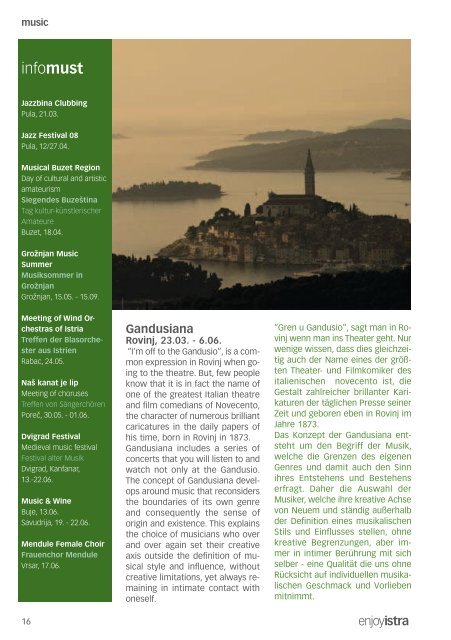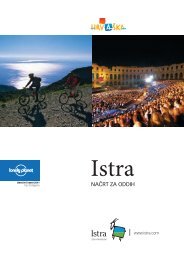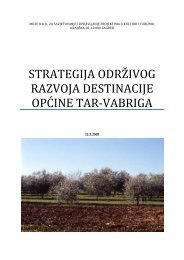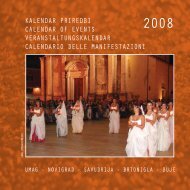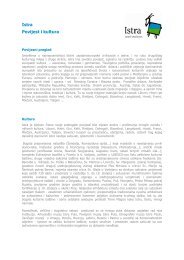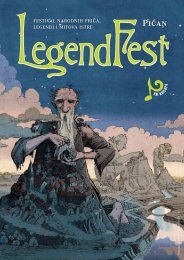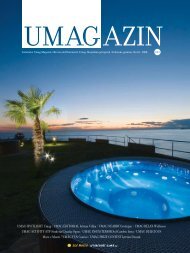enjoynature - Istra
enjoynature - Istra
enjoynature - Istra
Erfolgreiche ePaper selbst erstellen
Machen Sie aus Ihren PDF Publikationen ein blätterbares Flipbook mit unserer einzigartigen Google optimierten e-Paper Software.
music<br />
music<br />
infomust<br />
Jazzbina Clubbing<br />
Pula, 21.03.<br />
Jazz Festival 08<br />
Pula, 12/27.04.<br />
Musical Buzet Region<br />
Day of cultural and artistic<br />
amateurism<br />
Siegendes Buzeština<br />
Tag kultur-künstlerischer<br />
Amateure<br />
Buzet, 18.04.<br />
Grožnjan Music<br />
Summer<br />
Musiksommer in<br />
Grožnjan<br />
Grožnjan, 15.05. - 15.09.<br />
Meeting of Wind Orchestras<br />
of Istria<br />
Treffen der Blasorchester<br />
aus Istrien<br />
Rabac, 24.05.<br />
Naš kanat je lip<br />
Meeting of choruses<br />
Treffen von Sängerchören<br />
Poreč, 30.05. - 01.06.<br />
Dvigrad Festival<br />
Medieval music festival<br />
Festival alter Musik<br />
Dvigrad, Kanfanar,<br />
13.-22.06.<br />
Music & Wine<br />
Buje, 13.06.<br />
Savudrija, 19. - 22.06.<br />
Mendule Female Choir<br />
Frauenchor Mendule<br />
Vrsar, 17.06.<br />
Gandusiana<br />
Rovinj, 23.03. - 6.06.<br />
“I’m off to the Gandusio”, is a common<br />
expression in Rovinj when going<br />
to the theatre. But, few people<br />
know that it is in fact the name of<br />
one of the greatest Italian theatre<br />
and film comedians of Novecento,<br />
the character of numerous brilliant<br />
caricatures in the daily papers of<br />
his time, born in Rovinj in 1873.<br />
Gandusiana includes a series of<br />
concerts that you will listen to and<br />
watch not only at the Gandusio.<br />
The concept of Gandusiana develops<br />
around music that reconsiders<br />
the boundaries of its own genre<br />
and consequently the sense of<br />
origin and existence. This explains<br />
the choice of musicians who over<br />
and over again set their creative<br />
axis outside the definition of musical<br />
style and influence, without<br />
creative limitations, yet always remaining<br />
in intimate contact with<br />
oneself.<br />
“Gren u Gandusio”, sagt man in Rovinj<br />
wenn man ins Theater geht. Nur<br />
wenige wissen, dass dies gleichzeitig<br />
auch der Name eines der größten<br />
Theater- und Filmkomiker des<br />
italienischen novecento ist, die<br />
Gestalt zahlreicher brillanter Karikaturen<br />
der täglichen Presse seiner<br />
Zeit und geboren eben in Rovinj im<br />
Jahre 1873.<br />
Das Konzept der Gandusiana entsteht<br />
um den Begriff der Musik,<br />
welche die Grenzen des eigenen<br />
Genres und damit auch den Sinn<br />
ihres Entstehens und Bestehens<br />
erfragt. Daher die Auswahl der<br />
Musiker, welche ihre kreative Achse<br />
von Neuem und ständig außerhalb<br />
der Definition eines musikalischen<br />
Stils und Einflusses stellen, ohne<br />
kreative Begrenzungen, aber immer<br />
in intimer Berührung mit sich<br />
selber - eine Qualität die uns ohne<br />
Rücksicht auf individuellen musikalischen<br />
Geschmack und Vorlieben<br />
mitnimmt.<br />
Z vijulini sopu muškardini<br />
Hum, 7.06.<br />
To prevent it from being completely forgotten,<br />
traditional Istrian music is once again presented<br />
at the workshop of violin players or other traditional<br />
instruments - bajs (double bass), clarinet and<br />
trieština (diatonic button accordion). Regardless of<br />
the musician’s skill and knowledge, this workshop<br />
is open for all comers. Participant will present all<br />
their accomplishments during the 3rd meeting<br />
called Z vijulin sopu muškardini.<br />
Zasopimo na organić<br />
Gračišće, 18.05.<br />
In Istrian musical tradition the term organić refers<br />
to a musical instrument that is commonly known<br />
as harmonica. With its simple appearance and relatively<br />
modest music potential it has been a favourite<br />
Istrian instrument since the mid-19th century.<br />
Gračišće, one of some thirty town-jewels of central<br />
Istria has become the cradle of the newly awoken<br />
love for organić. The first gathering of musicians<br />
was held in 1996 when 23 players from entire Istria<br />
took part. Every year on the third Sunday in May<br />
there is an increasing number of organić devotees<br />
arriving in Gračišće for this unique event.<br />
Z vijulini sopu muškardini<br />
Um die traditionelle istrische Musik nicht in Vergessenheit<br />
geraten zu lassen, hat sie ihren Platz in einem<br />
Workshop für Violinespieler und anderer traditioneller<br />
Instrumente gefunden - Bajs, Klarinette oder<br />
Trieština. Ungeachtet dessen, ob jemand auf diesen<br />
Instrumenten spielen kann oder nicht, die Türe dieses<br />
Workshop steht für alle Interessierte offen. Das<br />
erworbene Wissen wird den Besuchern während<br />
des 3. Treffens von „Z vijulin sopu muškardini“ vorgestellt.<br />
Spielen wir auf<br />
der Mundharmonika<br />
Unter dem Begriff „organić“, versteht man in der<br />
istrischen Musiktradition ein Instrument, dessen<br />
übliche Bezeichnung Mundharmonika ist. Dieses<br />
einfach gestaltete Instrument mit einem relativ bescheidenen<br />
musikalischen Potential, war in Istrien<br />
bereits Mitte des 19. Jahrhunderts beliebt. Gračišće,<br />
eines von etwa dreißig Städtchen, die als Kleinod<br />
von Zentralistrien bezeichnet werden können, wurde<br />
zur Wiege einer neuerwachten Liebe zur Mundharmonika.<br />
Das erste Treffen der Mundharmonikaspieler<br />
fand im Jahr 1996 statt, als 23 Mundharmonikaspieler<br />
aus ganz Istrien vertreten waren.<br />
16 17


